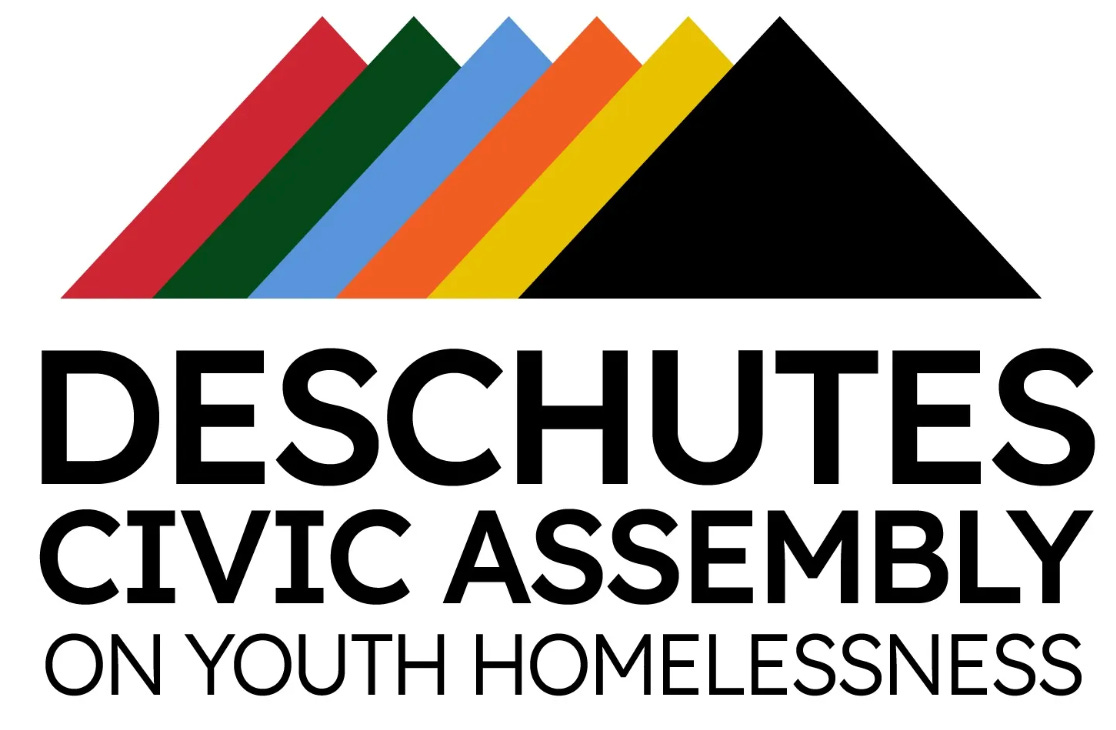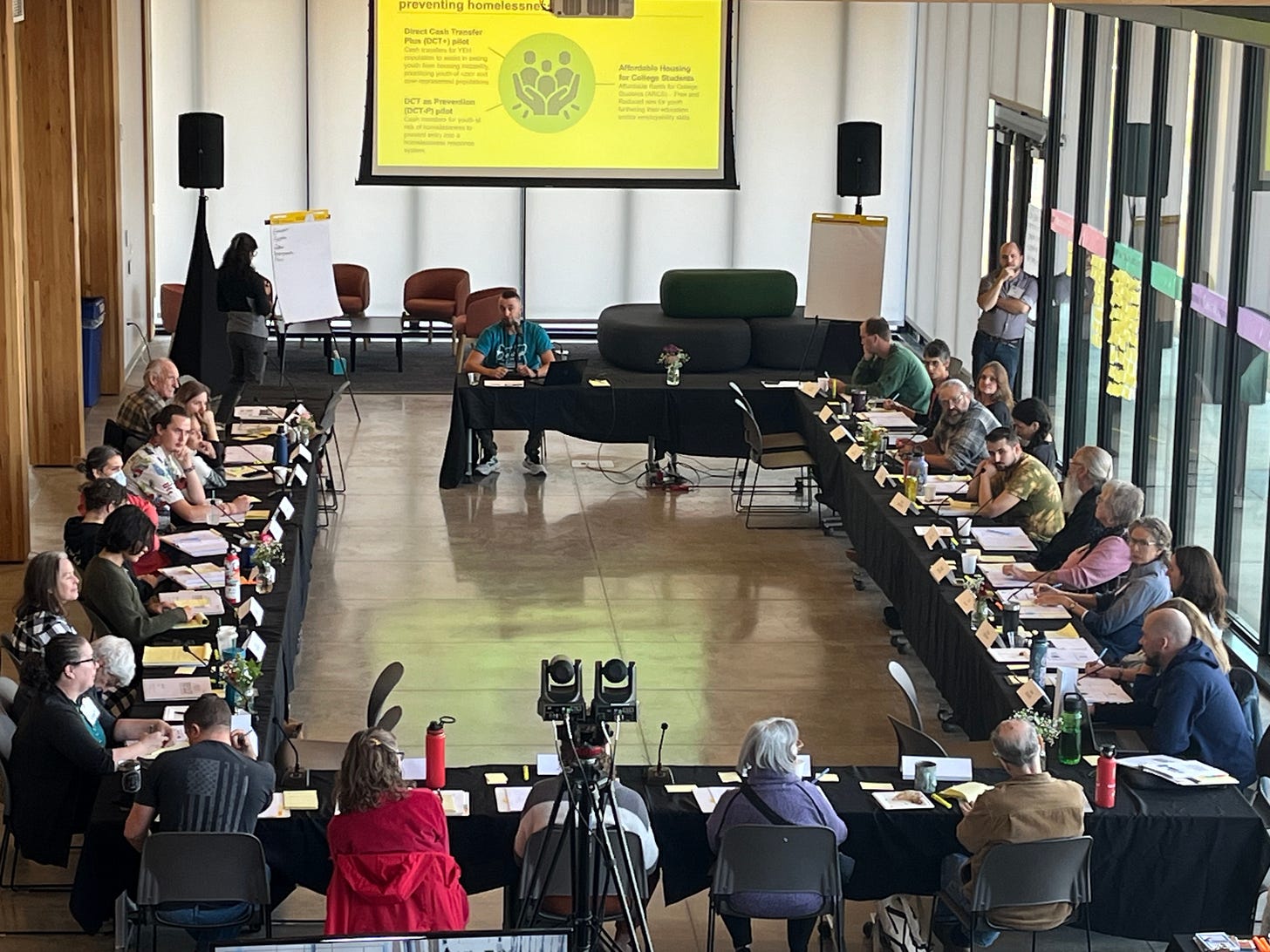A few weeks ago in Oregon, as Americans hurtled toward yet another turbulent election, I made the journey from lush Portland to dry Bend to witness the Deschutes Civic Assembly. I’d never observed an assembly before, despite advocating on behalf of democracy by lottery for many years. Now was my chance to see real government by the people. As I drove over Mt. Hood and plunged into the austere beauty of the desert, one question recurred in my mind: can we find a way of doing politics that doesn’t leave citizens outraged, exhausted, and at each others’ throats?
The answer, I confirmed, is yes. Over the weekend, I watched as two dozen Central Oregonians learned, listened, and talked about the region’s youth homelessness crisis: how it happens, why it’s growing, and what to do about it. The ordinariness of the proceedings struck me most; unlike typical legislative committees—dominated by politicians—this one featured no partisan snipes and zero grandstanding. And in contrast to open public meetings, citizens weren’t screaming at officials or spewing a torrent of overheated rhetoric. Instead, the delegates attended to their work with diligence, professionalism, and a sense of civic duty. “We’ve got to look at the cause,” said Alex, a middle-aged guy in jeans and Timberlands, during the proceedings. “We’ve got to get at the root.”
Hearing from state and local groups about what drives kids onto the streets gave Bill, an older delegate, a healthy dose of perspective. “I feel a sense of being fortunate in our own experience,” he remarked to his colleagues. “We’ve had families that were supportive and had the resources to provide us with secure housing growing up.” Thirty-something Kathryn, hair in curls, expressed even deeper empathy with the formerly-homeless young people who addressed them: she herself had lost housing in her youth after becoming estranged from her father. “Maybe kids don’t feel safe at home because the parents don’t feel financially secure,” she told me, drawing on her own experience.
War is politics “by other means,” Clausewitz famously says. The Prussian general made this observation during the Napoleonic Wars, which swept Europe at the same time that liberal republicanism emerged in the wake of the French and American Revolutions. His insight should give us pause. On both fields—that of battle, and that of politics—the usual structure of engagement is one of combat. We routinely describe the electoral system as adversarial, and we deploy the same words when talking about bloody conflagrations as we do elections: campaigns, partisans, field operations. For many, Clausewitz is right: Politics is war by other means.
Yet while this may be descriptively accurate, it reveals a perverse status quo. Social science and evolutionary biology have discovered that human beings are pro-social creatures: we evolved to be friendly and cooperative. And as theologian Luke Bretherton argues in Christ and the Common Life, politics is supposed to be the practice by which diverse peoples build a common life together—by which strangers become neighbors. When we go to war, though, we don’t seek to make the other our neighbor. We seek to eliminate them. War, from this perspective, is the destruction of politics, not its apotheosis.
To model a political system on war, then, is to breed the very nihilistic energies now convulsing our nation. And a cursory glance at American history shows that, far from functioning smoothly, time and again the party system has produced a febrile social state—often to the point of violence. There are many cleavages in our society: class, generation, regional identity, and more. But while conflict among people is inevitable, how we manage it is not. The problem in our country isn’t that Americans naturally fear, loath, and hate each other, which gets expressed in our elections. It’s that elections make Americans fear, loath, and hate each other, because it splits us into warring tribes locked in a zero-sum death match.
Citizens’ assemblies offer a different model, one in which conflict, rather than leading to war, gets handled in a healthy, productive manner. In the place of combative campaigns, it offers democratic lotteries. Instead of negotiation (power over) it promotes deliberation (power with). In lieu of winner-take-all, it cultivates consensus, compromise, and the common good. Citizens’ assemblies succeed where elections fail, because rather than pitting people against each other, it turns them into a united team with a joint goal.
That’s what I saw during my weekend in Bend: a group of everyday people from all walks of life transforming from strangers to neighbors before my very eyes. Working as one, they bonded quickly and discovered a shared sense of solidarity—and power. It felt good. It felt like freedom. “This is trickle-up democracy,” Kathryn told me, smiling as pink clouds streaked across the desert sky at the end of the second day. “We need more.”
This post was written for Healthy Democracy, which designed and facilitated the Deschutes Civic Assembly. Please consider donating to this important non-profit.






